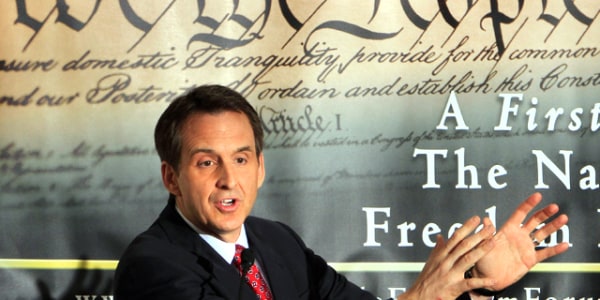In their debate Monday, the seven Republican presidential contenders showed that they haven’t quite yet focused on a question that will be hard to avoid: how to resolve the irrepressible conflict between America’s overseas military commitments and its debt burden.
It was a questioner in the audience Monday night, truck driver Greg Salts from Manchester, N.H., who framed the issue sharply: “I support the U.S. military. But frankly, we're in debt up to our eyeballs. We have nation building going on around the world ... We still have military bases all over Europe, all over Asia.”
In his own way, Salts was saying some of what another Republican, Defense Secretary Robert Gates, has been saying in recent days, as he prepares to retire, 45 years after entering government service.
To the NATO meeting on Friday in Brussels and in earlier speeches on his farewell tour, Gates has bluntly said what Mitt Romney, Newt Gingrich and the other GOP presidential hopefuls have only begun to grapple with: “The United States faces a serious fiscal predicament that could turn into a crisis — of credit, of confidence, of our position in the world — if not addressed soon.”
The looming fiscal crunch will not spare military spending.
On Wednesday in his farewell testimony to the Senate Appropriations Committee, Gates said “we need to be honest” about the consequences of a smaller military which will “be able to go fewer places and be able to do fewer things.”
Spending cuts must be done in an open and candid way so that the nation “consciously acknowledges and accepts additional risk in exchange for reduced investment in the military.”
He warned the Senate against the kind of across-the-board cuts that Congress made in the 1970s — “a disastrous period for our military” — resulting in “a hollowing out of the force.”
He also gave one last reminder that defense costs are increasingly a matter of rising health care spending.
“Sharply rising health care costs are consuming an ever larger share of this department’s budget — growing from $19 billion in 2001 to $52.2 billion” in the Obama administration's Fiscal Year 2012 budget request, he told the senators, asking that military retirees be required to pay increased fees for their health care coverage.
In a similarly somber warning last week, Gates told his NATO peers that “there will be dwindling appetite and patience in the U.S. Congress — and in the American body politic writ large — to expend increasingly precious funds on behalf of nations that are apparently unwilling to devote the necessary resources… to be serious and capable partners in their own defense.”
Running out of ammo
The immediate clash is over NATO’s mission in Libya, where “only 11 weeks into an operation against a poorly armed regime” as Gates pointed out, many allies “are beginning to run short of munitions, requiring the U.S., once more, to make up the difference.”
But the larger context is the whole array of military commitments and promises to military retirees that collide with growing entitlement programs such as Medicare — and tax revenues that are utterly inadequate to pay for all this.
Using the standard Congressional Budget Office measure, publicly held debt is nearly 70 percent of gross domestic product, more than double what it was in 2003.
Under CBO’s “alternative fiscal scenario,” which is its euphemism for not cutting payments to doctors serving Medicare patients and not allowing taxes to be increased, debt soars to about 150 percent of GDP soon after 2030.
One of the GOP presidential hopefuls, Rep. Michele Bachmann of Minnesota said during Monday’s debate that in order to win next year, “We need the peace through strength Republicans, we need the fiscal conservatives, we need the social conservatives.”
But the collision of defense spending and debt could bring one branch of the party “the peace through strength Republicans” into conflict with the fiscal conservatives.
Loren Thompson, a military analyst who heads the non-partisan Lexington Institute, said, “It’s clear the Republican candidates aren’t eager to bring up unpleasant subjects with the electorate. For example, the possibility that we may not be able to continue spending nearly half of all global military outlays is not something that they are willing to address.”
Thompson said the United States accounts for about 23 percent of global economic output, yet “is generating nearly half of all global military expenditures.”
During Monday’s event, there were two opposing poles and some GOP contenders in the middle.
Paul: Cut defense and withdraw the troops
The “cut debt and cut defense” pole was represented by Rep. Ron Paul of Texas.
“We should think about protecting our borders, rather than the borders between Iraq and Afghanistan. That doesn't make any sense to me,” he said, to applause from the audience, when immigration came up as a topic.
When Romney said he wanted the U.S. troops in Afghanistan “to come home… based upon the conditions on the ground determined by the generals,” Paul shot back, “I wouldn't wait for my generals. I'm the commander in chief ... I tell the generals what to do. I'd bring them home as quickly as possible. And I would get them out of Iraq as well."
And he added, "I wouldn't start a war in Libya. I'd quit bombing Yemen. And I'd quit bombing Pakistan.”
Slideshow 30 photos
Mitt Romney
He said, “I'd start taking care of people here at home because we could save hundreds of billions of dollars.”
Former Minnesota governor Tim Pawlenty represented the hawkish, or “peace through strength” side of the party.
“We have Iraq being probably one of the shining examples of success in the Middle East,” he contended.
And he invoked the image of the Sept. 11 attackers, who would have killed “30 million if they could have. If they had the capability to do that in their hands — and as soon as they get it, they'll try.”
Rebuffing Paul, Pawlenty said, “If there are individuals I have intelligence on, or groups in Yemen that present a threat to our security interests in that region or the United States of America, you can bet they will hear from me and we'll continue the bombings.”
Between those two poles was the apparent frontrunner in the GOP race, Romney, who while opposing a precipitous withdrawal from Afghanistan, also said, “We've learned that our troops shouldn't go off and try and fight a war of independence for another nation.”
Slideshow 7 photos
The public life of Tim Pawlenty
One GOP contender who wasn’t at the debate, former Utah governor and China envoy Jon Huntsman has begun to raise the issue of defense spending, asking last weekend, “When you look at Afghanistan, can we hang out until 2014 and beyond?”
He said, “You can if you're willing to pay another quarter of a trillion dollars to do so. But if it isn't in our direct national security interest and if there isn't a logical exit strategy and if we don't know what the cost is going to be in terms of money and human lives, then I think you have to say it's probably time we reevaluate this ... ”
Entitlements vs. armaments
But it's a Republican non-candidate, Gates, who has spoken most eloquently about the fiscal dilemma.
Because most of America’s NATO allies have more generous welfare states than the United States does, they do not nearly spend as much on the hardware of war as the United States does.
“For all but a handful of allies, defense budgets in absolute terms, as a share of economic output, have been chronically starved for adequate funding for a long time," Gates said last week in Brussels. "Just five of 28 allies — the U.S., U.K., France, Greece, along with Albania — exceed the agreed (level of) 2 percent of GDP spending on defense.”
The United States now spends about 4 percent of GDP on defense, compared to about 9 percent of GDP when John F. Kennedy was president.
If NATO wants to engage in operations such as imposing a no-fly zone on Libya, the lagging NATO members will need to spend more on weapons and on “intelligence, surveillance, and reconnaissance assets,” Gates told the NATO ministers.
But he said, “fiscal, political and demographic realities make this unlikely to happen anytime soon.”
What Gates didn’t say, but is quite clear in reports from CBO and others: very similar "demographic realities" are inevitably pushing the United States toward the European model.
CBO projects that the ratio of entitlement spending to defense spending, currently two to one, will grow to three to one by 2020. Beyond that, an aging population and health care cost growth that outstrips income growth will make the mismatch ever bigger.

